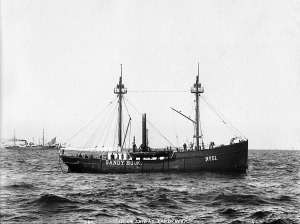Charles V. Skargon (b. 1900): An Introduction
During the years following my North Atlantic journeys I often thought about those times, my adventures and dangers and mad rolling oceans, the various shipmates of the past, the travels west and east. The dirty nights on the lightships and the fights on rolling ships, everything.
Charles V. Skargon, ‘From Boy to Man the Hard Way’, p. 228.
The sea was a strong influence on the life of Charles V. Skargon. It was here he arrived a boy and set off, the hard way, on tides of uncertainty and war. He returned a man who had experienced the world and weathered the darkest of storms.

Skargon was born to a washerwoman mother and a sailor father in 1900. He was the fourth of nine children. The family lived a modest but comfortable life; Skargon’s first recollection is of running ‘an errand to the local shop for a small purchase, (large ones being out of the question as Dad was on a pound a week).’ (1) He remembers his early childhood fondly, sprinting down to the docks to greet his father when he returned from voyage, ‘at sea six days out of seven’, (1) and playing on makeshift punts in the bog affectionately named the “mud” by him and his brothers. It was here he saved another boy from drowning. ‘I couldn’t swim then, not having learned, and I suppose I was about eight or nine years old at that time… I made it nearly up to my shoulders and I was getting scared myself. I kept on reaching out my pole and by a great effort the boy made it… I felt like a hero and was, I suppose, looking forward to grateful thanks from his mother for saving her son’s life! … she slapped me hard across the ears and declared that it was I who had pushed him in.’ (1) As fate would have it, the boy passed away later in life when his vessel hit a mine. Skargon went on to rescue others in similar tragedies.
At the age of 13, Skargon was sent off for a job at sea, having finished schooling the year before. He was first a pantry-boy on the railway boats before joining the Royal Navy in 1915 as a steward after the First World War broke out. His short naval career was one fraught with danger and devastation. The North and Irish Seas where he operated was littered with sunken ships and hidden mines and German submarines. ‘Here were grim evidences of what had happened. I had never seen so many dead bodies before. All seamen, and most of them stripped of their clothing.’ (13.)
Yet through the horrors of this as well as other times in his life, Skargon writes modestly of himself and his experiences. After discharge from naval duty the following year due to acute peritonitis, Skargon resumed work in the lightship service, in which time he also married and had a daughter. The lightships were vessels which operated as lighthouses in open sea, invaluable to other ships sailing in dark or stormy conditions. The work was tough and reward little, but Skargon loved and valued it. He was saving people. ‘We steamed on night and day, fine weather and foul.’ (14.)
Skargon’s seafaring days ended three years later but these are the times he reflects on most strongly in his autobiography. He wrote From Boy to Man the Hard Way partly as a celebration of the work and efforts of the naval and lightship services. It was typed when Skargon was 74, the 100,000 words documenting life at sea a remarkable feat of recollection and reverence for those he worked alongside, many of which, like Skargon, were from a working-class background. As a final note, I feel Charles V. Skargon would like me to remark, ‘If ever a passenger in a ship has the privilege of passing a lightship on his or her sea journey I would say “Spare a kind thought for the bravest men on the sea”‘. (188)
Skargon, Charles V. ‘ From Boy to Man the Hard Way’, Burnett Archive of Working Class Autobiography. University of Brunel Library, Special Collection, 2:712.
‘Charles V. Skargon’, in John Burnett, David Mayall and David Vincent. ‘The Autobiography of the Working Class: An Annotated, Critical Bibliography‘, Brighton: Harvester, 1984, vol. 2, no. 712.
PBS. America, ‘WWI Timeline: 1915.’ [online]
Available at: http://www.pbs.org/greatwar/timeline/time_1915.html
[Accessed 2nd October, 2014]
Digplanet, ‘Sandy Hook.‘ [online]
Available at: http://www.digplanet.com/wiki/Sandy_Hook
[Accessed 29th September, 2014]

Leave a Reply